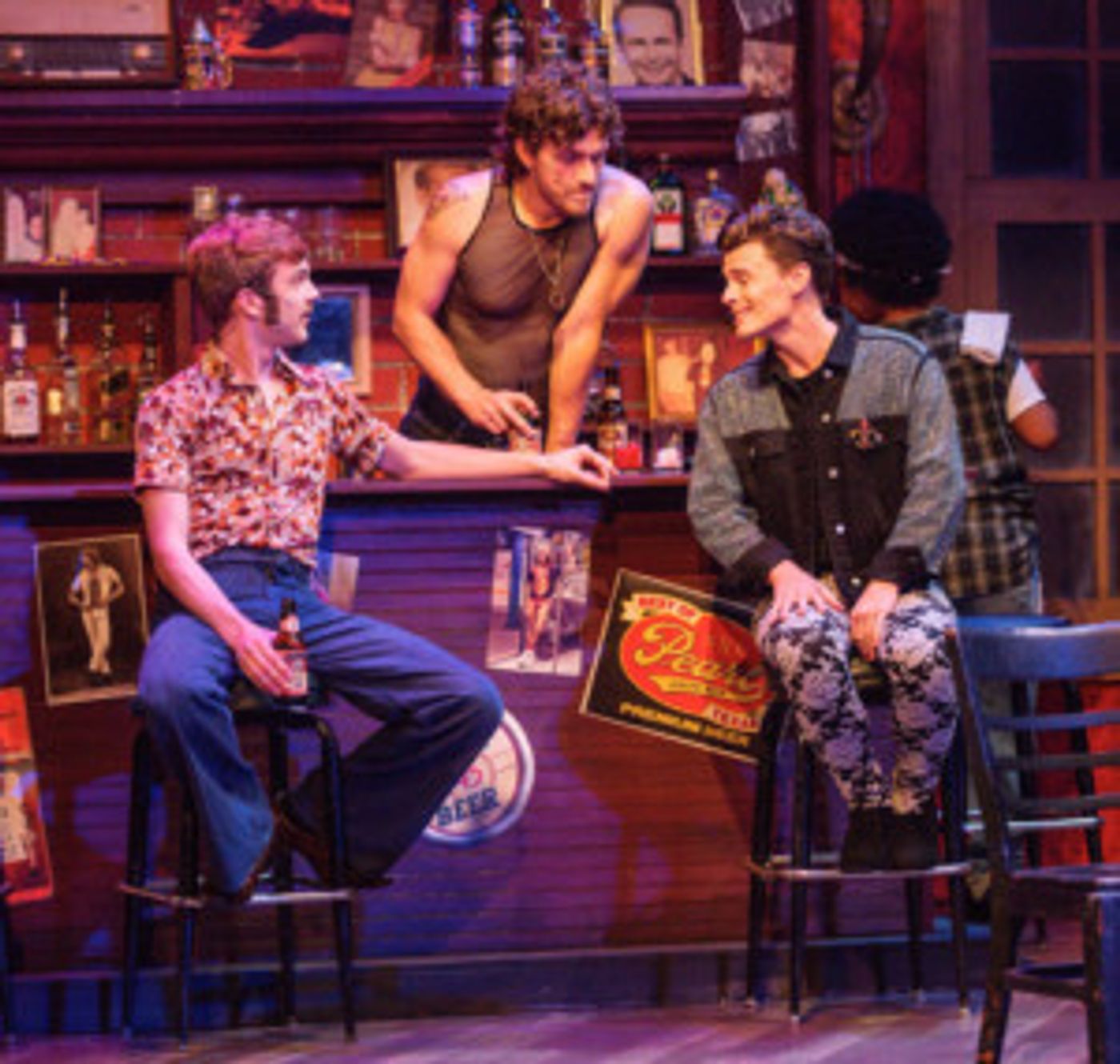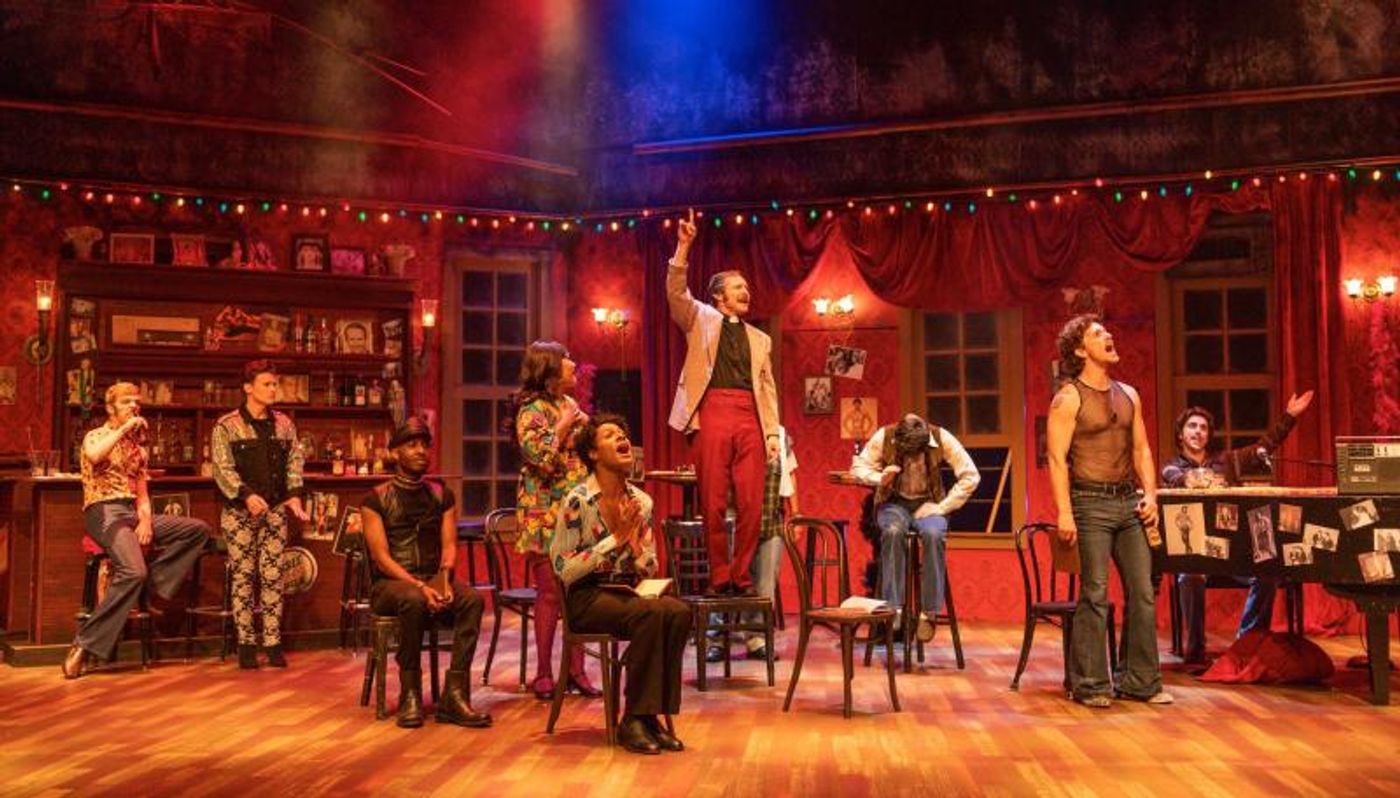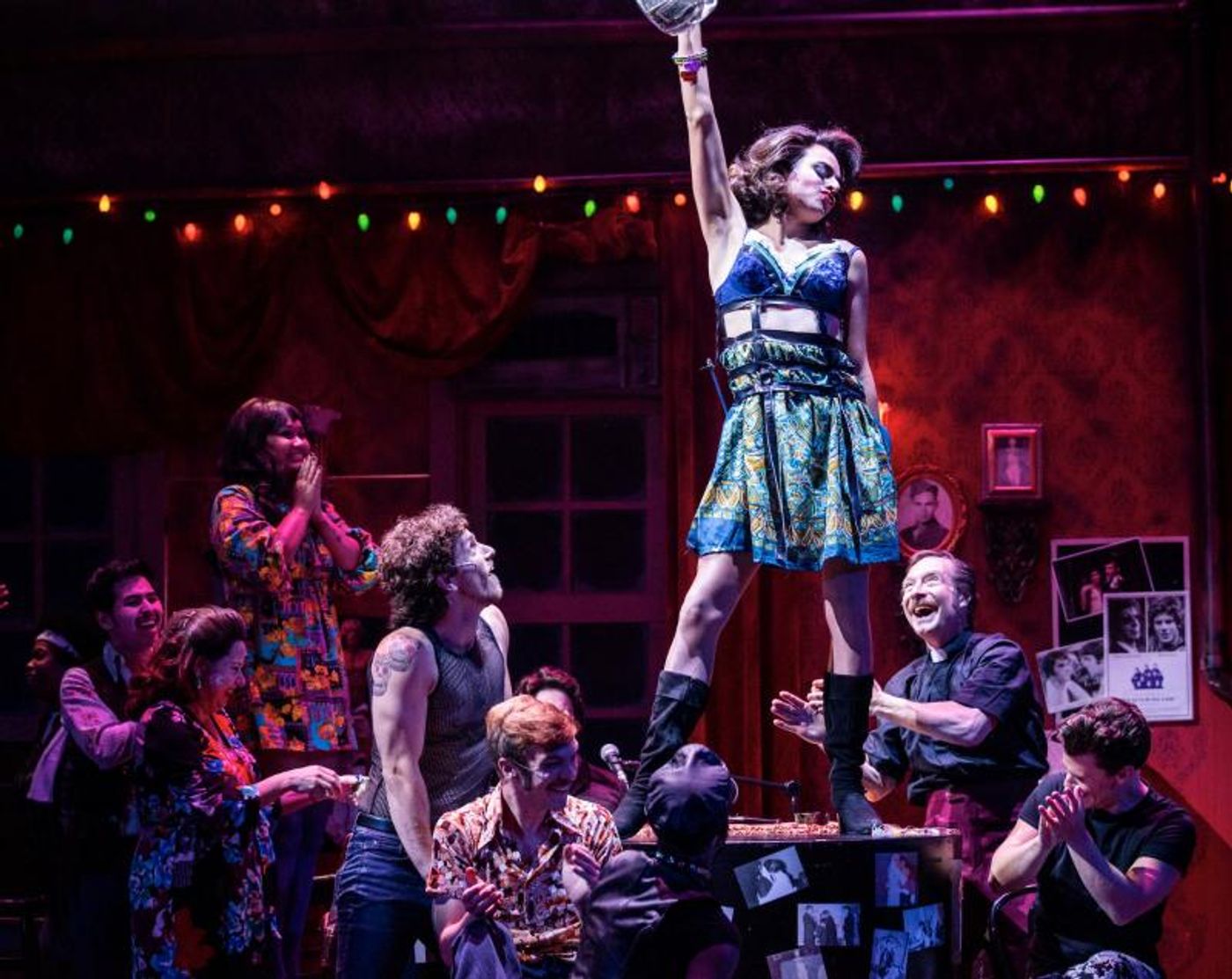Review: THE VIEW UPSTAIRS Provides a Moving Glimpse into the Past at Uptown Players

I didn't hear about the Upstairs Lounge Fire until I started college, an odd personal fact considering that I spent much of my teens going to school and causing trouble for myself and my parents just down the street from where the arson took place 46 years ago. Shortly before 8 PM on Sunday, June 24, 1973, following a service of the Metropolitan Community Church, a fire broke out on the stairwell of the Upstairs Lounge on Chartres Street in the French Quarter, completely enveloping the gay bar in flames within minutes. The bartender was able to bring about twenty patrons to safety on the roof, but everyone else remained trapped; the bar was only accessible from the ground by a staircase where the fire had started, and bars and boards prevented victims from jumping out of the windows to safety. Perhaps equally as tragic is that this pivotal moment in American gay history went largely unacknowledged for decades afterwards, with many artists and historians only giving the event its due diligence within the last fifteen years.
One of these memorials comes to us in the form of the Off-Broadway musical, THE VIEW UPSTAIRS, the last musical of Uptown Players' current season running through July 7 at the Kalita Humphreys Theater. Under the thoughtful direction of Cheryl Denson, the cast and creative team approaches the story of the massacre with an incredible amount of compassion and authenticity that comes to audiences at a critical moment as the 50th anniversary of the Stonewall riots lead us to reflect on how far the fight for equality has come and how much further there is left to go.
With book, music, and lyrics by Max Vernon, THE VIEW UPSTAIRS depicts a pivotal night in the life of fashion designer and angsty young gay man Wes (Blake McIver). Returning home to New Orleans after a stint in New York, Wes has bought the space in which the Upstairs Lounge fire occurred and plans to tear it down so he can build his flagstone clothing store. As he inspects the property, the ghosts (spirits? hallucinations? it's never quite clear) of the deceased bar patrons come to life, sharing their stories and teaching Wes about the trials and tribulations they have experienced as queer men and women in the Deep South. What follows is a roughly two-hour meditation on how LGBTQ life and activism have changed since the early-70s and how forgetting our past can mean realizing a completely unfulfilling future.
While the premise is contrived and occasionally overly didactic, the emotion of the story and its participants remains heartbreakingly sincere, and the show is at its best when characters are allowed to speak of their own experiences on their own terms without having to deliver a moral stronger than dive-bar hooch. And while the characters exist as individuals in their own right, this cast is ultimately an ensemble in every sense of the word, partying together with intoxicating chemistry and sending their beautiful voices to the rafters under the expert music direction of Kevin Gunter. Every performer appears to be living in the moment, to the point where most of the jokes and Trevor Wright's delightfully inventive choreography feel refreshingly spontaneous.

As the protagonist, McIver skillfully humanizes Wes and prevents the character from becoming just another stereotypical self-absorbed millennial. While on the page his dialogue may seem as though it was written by someone who only ever learned slang from reading Teen Vogue, McIver shows that much of Wes's self-obsession comes from a place of deep insecurity, and he conveys this anxiety through his carefully controlled nervous energy as well as mournful glances at a community that no longer exists and of which he feels can never be a part. While not all of the musical's songs may be memorable, McIver mixes a great deal of emotion into his beautiful tenor voice in bittersweet numbers such as "Some Kind of Paradise" and "The Future Is Great!!" in which Wes realizes that, after 1973, circumstances have to get much worse for the LGBTQ community before they can begin to get better.
After Wes, it is difficult to say who the show's leads are since all of the bar patrons more or less receive equal time in the spotlight. Another decent candidate would be Will Carleton as the softly sweet Patrick, a young gay man with a troubled past and the potential love interest of Wes. Carleton shows real tenderness in his many moments with McIver, and their duet "Crazy Notion" is one of the musical's emotional highlights as it shows both men learning to break down their emotional barriers just before tragedy strikes. Unfortunately, while audiences will leave feeling as though they know Patrick well as a lover, they will not feel that they know him as a person; many of the character's monologues and solo numbers lack the depth given to his interactions with others.
 The audience's favorite characters on opening night were Freddy (Jordi Viscarri), the brashly outspoken young drag queen, and Willie (Walter Lee), an African-American man of indeterminate age but an assured sense of humor. As Freddy, Viscarri exudes confidence and an inspiring optimism, making it no wonder that the character is ready to go on with the show even after personal tragedy strikes him early on. His electrifying drag number "Sex on Legs" is hands-down the most exciting part of the show, both because of Viscarri's non-stop energy and soaringly high vocals as well as because it is one of the few moments in the musical where audiences get to see all of the patrons living without a care in the world. Petty differences and outside discrimination are put aside to celebrate what it means to be part of a family that could only exist inside the walls of the Upstairs Lounge.
The audience's favorite characters on opening night were Freddy (Jordi Viscarri), the brashly outspoken young drag queen, and Willie (Walter Lee), an African-American man of indeterminate age but an assured sense of humor. As Freddy, Viscarri exudes confidence and an inspiring optimism, making it no wonder that the character is ready to go on with the show even after personal tragedy strikes him early on. His electrifying drag number "Sex on Legs" is hands-down the most exciting part of the show, both because of Viscarri's non-stop energy and soaringly high vocals as well as because it is one of the few moments in the musical where audiences get to see all of the patrons living without a care in the world. Petty differences and outside discrimination are put aside to celebrate what it means to be part of a family that could only exist inside the walls of the Upstairs Lounge.
Similarly, Lee makes this sense of comfort a key part of his portray of Willie. Much of what makes the character so likeable is Lee's impeccable comedic sensibility, cracking jokes and trading barbs the way that can only be done by someone who has seen it all and rolled with the punches along the way. It also helps that his powerful voice effortlessly runs the gamut between improvisational riffs in soul numbers or the calculated and controlled emotion of the show's moving ballad "Theme Song."
There simply is never enough space in which to praise every performer for their work, especially in a musical that relies so much on ensemble interactions. I will just let readers know that, should they see the show, they will be delighted by the smooth vocals of Peter DiCesare as the piano-playing Buddy, and Steven Pounders and Taylor Wright give touching performances as an MCC pastor and a struggling hustler, respectively. Both roles are unfortunately woefully underdeveloped by the script, but both actors craft full characterizations out of pathos and a deep commitment to sharing this touching story with a wider audience.
The creative team of the production brings THE VIEW UPSTAIRS to life in manner so authentic that it almost becomes immersive. Scenic designers Dennis Canright and Kevin Brown have created a New Orleans gay bar as real as every seedy lounge I snuck into in high school and beyond, complete with walls covered in Judy Garland memorabilia and pull-out pin-ups of 70s beefcakes. At the same time, they carefully infuse elements that suggest the bar's ultimate fate, including wallpaper that becomes progressively more charred as it runs up the wall and light rigging that hangs precariously over the cast as they laugh and dance. Jason Lynch and Kyle Harris' lighting design includes plenty of beats and washes that set the moods for the musical's genre-spanning orchestrations, and Suzi Cranford and Jessie Chavez's costume design evokes gay culture of the 70s while also allowing the outfits to speak to each character's individuality.
Vernon's show certainly has its share of imperfections, and this is not the space to discuss its aesthetic merits or how well or not it represents the events of June 24, 1973. What is worth noting, though, is that Uptown Players has chosen to tell this story with an incredible amount of heart and talent, and - as mentioned earlier - it provides audiences with plenty of questions to consider as the LGBTQ movement looks to keep moving forward. How far are we willing to go to fight for ourselves and others? What do we risk losing when we choose to lose sight of our past? And how does art especially help us to hurt, and heal, and grow?
Reader Reviews
Videos

